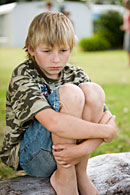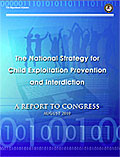

The challenge of protecting children has been made significantly more complex by ready access to the Internet. Parents, child protection agencies, and law enforcement are struggling to protect children from the threat of online victimization, which can include pornography, cyberbullying, abduction, sexual abuse, and child prostitution.
OJJDP took the lead early on in addressing this serious problem. More than a decade ago, the Office established the Internet Crimes Against Children (ICAC) task force program, which helps state and local law enforcement agencies prevent, interdict, and investigate technology-facilitated child sexual exploitation and Internet crimes against children. The 61 ICAC task forces use aggressive investigations, prosecutions, computer forensics, and community outreach to address cybercrime. By helping state and local law enforcement agencies develop effective and sustainable responses to online child victimization and child pornography, OJJDP and the ICAC program have built capacity at the local level to address related offenses.
In addition to ICAC, the Office supports a wide range of programs that promote evidence-based strategies to protect children against abuse, neglect, abduction, commercial sexual exploitation, and exposure to community and domestic violence.
 In August 2010, the U.S. Department of Justice (DOJ) released the National Strategy Conference on Combating Child Exploitation, in San Jose, CA. For more information, see the Upcoming Events section in the issue.
In August 2010, the U.S. Department of Justice (DOJ) released the National Strategy Conference on Combating Child Exploitation, in San Jose, CA. For more information, see the Upcoming Events section in the issue.
 In September 2010, Attorney General Eric Holder announced Defending Childhood, an initiative which aims to prevent children's exposure to violence, mitigate the negative effects experienced by children exposed to violence, and develop knowledge about and spread awareness of this issue. A key component of the Defending Childhood initiative is a two-phase, multiyear demonstration program, which includes planning grants for eight demonstration sites. The grantees are collaborating with other local organizations to develop comprehensive community-based strategies to prevent and reduce the impact of children's exposure to violence in their homes, schools, and communities. In addition to the demonstration program grants, DOJ committed additional funding for research, evaluation, public awareness, and partnerships related to the initiative. Training and technical assistance is being provided by the Safe Start Center, OJJDP's national resource center for information and training related to reducing children's exposure to violence. Training expanded in 2011 to include a conference in January organized by the center to train multisector "teams" from communities across the country on the most effective collaborative strategies for reducing children's exposure to violence.
In September 2010, Attorney General Eric Holder announced Defending Childhood, an initiative which aims to prevent children's exposure to violence, mitigate the negative effects experienced by children exposed to violence, and develop knowledge about and spread awareness of this issue. A key component of the Defending Childhood initiative is a two-phase, multiyear demonstration program, which includes planning grants for eight demonstration sites. The grantees are collaborating with other local organizations to develop comprehensive community-based strategies to prevent and reduce the impact of children's exposure to violence in their homes, schools, and communities. In addition to the demonstration program grants, DOJ committed additional funding for research, evaluation, public awareness, and partnerships related to the initiative. Training and technical assistance is being provided by the Safe Start Center, OJJDP's national resource center for information and training related to reducing children's exposure to violence. Training expanded in 2011 to include a conference in January organized by the center to train multisector "teams" from communities across the country on the most effective collaborative strategies for reducing children's exposure to violence.
OJJDP's Children's Advocacy Centers (CACs) help coordinate the investigation and prosecution of child abuse cases as well as treatment of the victims. Recognizing that child abuse is a multifaceted problem, CACs involve multidisciplinary teams of professionals—from child protective and victim advocacy services, medical and mental health agencies, and law enforcement and prosecution—who provide a continuum of services to victims and nonoffending family members. Currently, there are more than 700 CACs across the United States. These programs provided comprehensive intervention and treatment services to more than 270,000 children last year. Remarkably, they also provided child abuse prevention education to more than 500,000 children and adults during the same period. They are a valuable resource for community awareness regarding child abuse issues.
CACs have revolutionized the response to child sexual abuse in the United States and numerous foreign countries. Key research findings indicate that CAC cases have shorter investigative periods and higher rates of substantiation than non-CAC cases, shorten the length of time to disposition of child abuse cases, and increase referral rates and service provision of medical and mental healthcare to child victims.
The 27th National Symposium on Child Abuse in Huntsville, AL, on March 28–31, 2011.
Following are just a few examples of other ways OJJDP is working vigorously with communities, law enforcement, and social service agencies to ensure the safety and well-being of our nation's children:
- In its role as a national clearinghouse and resource center, the OJJDP-supported National Center for Missing & Exploited Children (NCMEC) offers critical intervention and prevention services to families and has supported law enforcement agencies at the federal, state, and local levels in cases involving missing and exploited children. NCMEC has assisted in the recovery of nearly 158,000 children.
- With the support of OJJDP, DOJ's Office of Justice Programs manages the AMBER Alert program, which issues media alerts on radio, television, highway signs, wireless devices such as mobile phones, and over the Internet when a law enforcement agency determines that a child has been abducted and is in imminent danger. The AMBER Alert program had helped recover 532 abducted children nationwide.
- Developed, managed, and guided by the National Council of Juvenile and Family Court Judges with funding from OJJDP, the Model Courts program is a network of juvenile and family courts in 34 states, one tribe (the Gila River Indian Community), and the District of Columbia that collaborate to reduce the number of, and achieve better outcomes for, foster children by improving dependency court practice through judicially led system reform.
- OJJDP funds the Web site.
Resources:
Visit the National Criminal Justice Reference Service and the U.S. Department of Health and Human Services' National Child Abuse Prevention Month Web site to find the latest resources and outreach materials on engaging communities in the prevention of child abuse.

